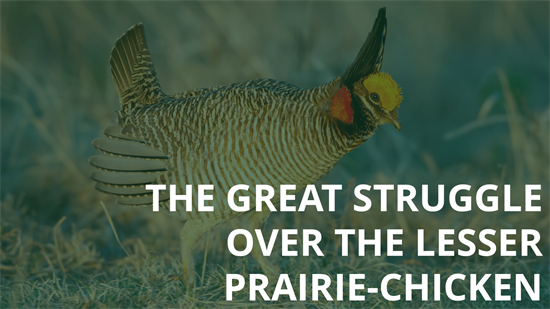The Great Struggle Over the Lesser Prairie-ChickenBy Congressman Ron Estes (KS-04)
Washington,
May 23, 2023
The great struggle over the lesser prairie-chicken By Congressman Ron Estes (KS-04) If you want to know what ruffles the feathers of an intrusive federal government, meet the humble lesser prairie-chicken. There’s been great debate in Washington about this bird, which finds its home more than 1,000 miles from the D.C. swamp in Kansas, Colorado, New Mexico, Oklahoma and Texas. At issue is whether the lesser prairie-chicken population needs classification as endangered by the U.S. Fish and Wildlife Service. In 2014, the Obama administration listed the bird as a threatened species under the Endangered Species Act. However, it was delisted in 2016 following the U.S. District Court for the Western District of Texas’ 2016 finding that the Fish and Wildlife Service conducted a flawed analysis, ignoring voluntary efforts of private landowners and the oil and gas industry to protect it. Despite losing this court case and an actual increase in the lesser prairie-chicken population, FWS charged ahead with an aggressive 12-month review process to relist the lesser prairie-chicken in 2021. Kansas farmers, ranchers and energy producers – those closest to the lesser prairie-chicken’s habitat – are excellent stewards of natural resources. They have repeatedly demonstrated responsible actions as they tend the land that feeds and fuels the world. What they don’t need is a heavy-handed government approach to land management – especially when those mandates are unfounded and not based on actual science. Successful, voluntary public-private conservation practices have prompted the lesser prairie-chicken population to increase by more than 50% through 2021, with a statistically insignificant decrease between 2021 and 22. Federal and state governments have spent millions of dollars to determine the population is stable. I wrote Interior Secretary Deb Haaland in 2021 to remind her that “current law provides FWS with discretion to prioritize critically impaired species, while giving lower priority to those species for which conservation efforts are already in place. There are currently extensive conservation measures underway and in development by states, landowners, and industry stakeholders that will benefit the LPC.” Nevertheless, a federal bureaucracy hungry for power and desperate to hinder American energy production moved forward with their inclusion of the lesser prairie-chicken on the threatened and endangered species list in 2022 – without following the science. Congress isn’t sitting idly by as President Biden and Interior Secretary Haaland usurp control over private property, hurting local economies. I reintroduced a bill this year – the Promoting Local Management of the Lesser Prairie-Chicken Act – that simply bars the Secretary of the Interior from listing the lesser prairie-chicken as endangered or threatened under the Endangered Species Act. Not only that, but my colleagues in the House and Senate have introduced a Congressional Review Act resolution. A CRA resolution allows an expedited process for the House and Senate to review federal regulations and, upon passage in both chambers and the president’s signature, revoke the regulation. If vetoed, a two-thirds majority vote in each chamber is required to overturn the rule. Even in a divided Senate, the CRA resolution passed with bipartisan support and now heads to the House where my friend and fellow Kansas colleague Rep. Tracey Mann (R-Kansas) has introduced the companion resolution of which I am a cosponsor. Unfortunately, the president has already indicated his intent to ignore the science and voices of rural Americans, side with federal bureaucrats, and veto the CRA. While it might seem extreme to squawk about this single species, it’s representative of the overall tone of the Biden administration – force unworkable mandates on hardworking Kansans to appease bureaucrats and elitists who aren’t impacted by their decisions. They’ve used this playbook before (think WOTUS), and this encroachment on private property rights will be replicated in state after state across the country. So while there seems to be great fuss over the lesser prairie-chicken, it’s critical that we hold the line and prevent the Biden administration from pursuing this hostile land grab. Kansas ag and energy producers are doing their part, and millions of taxpayer dollars have confirmed that the current conservation plan is working. This overbearing listing from left-wing bureaucrats isn’t helping the environment or the lesser prairie-chicken – it’s attacking the rights of Kansans and hurting our economy. Ron Estes, one of only a handful of engineers in Congress, worked in the aerospace, energy and manufacturing sectors before representing Kansas’ 4th Congressional District since 2017. He is a fifth-generation Kansan, former state treasurer, and serves on the House Committee on Ways and Means, Budget Committee, and Education and the Workforce Committee. |
Stay Connected
Use the following link to sign up for our newsletter and get the latest news and updates directly to your inbox.


